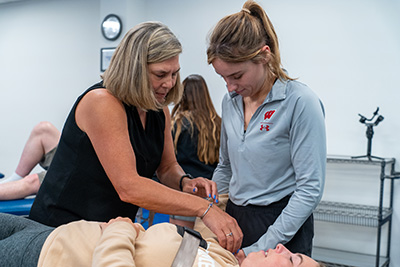
Erin Roberge is the Green Bay Packers' first full-time athletic trainer. (photo, courtesy Green Bay Packers)
Erin Roberge G’24, who had interned with the Green Bay Packers since July 2020, was hired full time as an assistant athletic trainer (AT) in June 2022. She is the first full-time female AT in the franchise’s history, and one of 21 female ATs across the NFL. (In 2021, the Professional Football Athletic Trainers Society reported a total of 161 NFL athletic trainers nationwide.)
“One of my favorite moments with the team was receiving an email from a girl who was participating in the Packers’ Junior Power Pack Reporter contest [for children aged 5 to 14]. She wanted to interview me about being the first female athletic trainer on the Green Bay Packers,” says Roberge. “Recognizing the influence that seeing women in these roles has on young girls and their aspirations brought a tear to my eye.”
Roberge pursued a career in football in part because she enjoys watching the sport, but also because of the variety of player positions and their specific needs. “It makes every rehab with a player different—consider the demands of an offensive lineman’s job compared with that of a wide receiver.”
Roberge grew up in St. Paul, Minnesota, and attended the University of Wisconsin for a bachelor’s degree in athletic training. She went on to earn a master’s degree in exercise science at Pennsylvania Western University, and now she has completed the first of two years in Moravian University’s doctor of athletic training program.

“I wanted to further my education as a clinician in order to become a better athletic trainer,” says Roberge, “and Moravian’s program provided me a great opportunity to continue to work while earning my degree. We’re required to come to campus only for the one-week sessions in the summer, which fits my schedule because that’s when I’m able to take time off from work.
“The faculty are super helpful and very understanding of the fact that you are working and might need more time to complete an assignment after a busy week,” adds Roberge. “They are flexible with your goals, too, whether that means taking a different course of classes or switching up your schedule to accommodate what you want to do as a clinician. That was most helpful to me because I could tailor the program to what I wanted to get out of it.”
Roberge says the best part of the experience has been the people—the professors and classmates. “I felt that I learned so much from talking with other professionals about their experiences and where they work around the country and comparing it to my own. Talking with them and working with professors who have expertise in a variety of spaces has helped me become a more well-rounded clinician.”
That well-rounded clinician is back in Green Bay applying her newly gained knowledge to the football team she serves and enjoying the rewards. “You spend many hours working with these guys every day and observing their progress,” she says. “My favorite part of the job by far is seeing those players back out on the field and able to do their job again. It is extremely rewarding, and I appreciate those moments.”